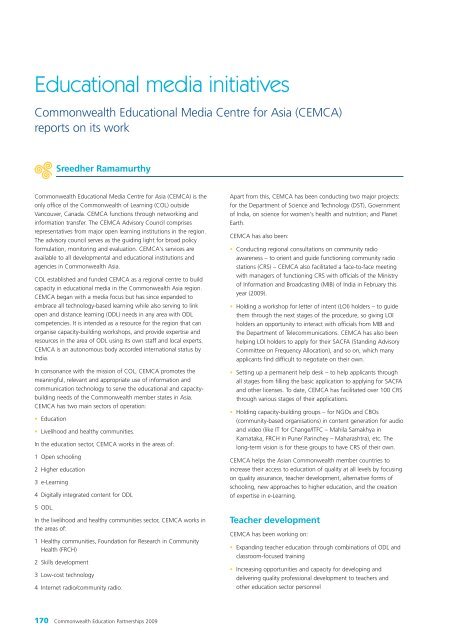Yearbook - United Nations Girls' Education Initiative
Yearbook - United Nations Girls' Education Initiative
Yearbook - United Nations Girls' Education Initiative
Create successful ePaper yourself
Turn your PDF publications into a flip-book with our unique Google optimized e-Paper software.
<strong>Education</strong>al media initiatives<br />
Commonwealth <strong>Education</strong>al Media Centre for Asia (CEMCA)<br />
reports on its work<br />
Sreedher Ramamurthy<br />
Commonwealth <strong>Education</strong>al Media Centre for Asia (CEMCA) is the<br />
only office of the Commonwealth of Learning (COL) outside<br />
Vancouver, Canada. CEMCA functions through networking and<br />
information transfer. The CEMCA Advisory Council comprises<br />
representatives from major open learning institutions in the region.<br />
The advisory council serves as the guiding light for broad policy<br />
formulation, monitoring and evaluation. CEMCA's services are<br />
available to all developmental and educational institutions and<br />
agencies in Commonwealth Asia.<br />
COL established and funded CEMCA as a regional centre to build<br />
capacity in educational media in the Commonwealth Asia region.<br />
CEMCA began with a media focus but has since expanded to<br />
embrace all technology-based learning while also serving to link<br />
open and distance learning (ODL) needs in any area with ODL<br />
competencies. It is intended as a resource for the region that can<br />
organise capacity-building workshops, and provide expertise and<br />
resources in the area of ODL using its own staff and local experts.<br />
CEMCA is an autonomous body accorded international status by<br />
India.<br />
In consonance with the mission of COL, CEMCA promotes the<br />
meaningful, relevant and appropriate use of information and<br />
communication technology to serve the educational and capacitybuilding<br />
needs of the Commonwealth member states in Asia.<br />
CEMCA has two main sectors of operation:<br />
• <strong>Education</strong><br />
• Livelihood and healthy communities.<br />
In the education sector, CEMCA works in the areas of:<br />
1 Open schooling<br />
2 Higher education<br />
3 e-Learning<br />
4 Digitally integrated content for ODL<br />
5 ODL.<br />
In the livelihood and healthy communities sector, CEMCA works in<br />
the areas of:<br />
1 Healthy communities, Foundation for Research in Community<br />
Health (FRCH)<br />
2 Skills development<br />
3 Low-cost technology<br />
4 Internet radio/community radio.<br />
Apart from this, CEMCA has been conducting two major projects:<br />
for the Department of Science and Technology (DST), Government<br />
of India, on science for women's health and nutrition; and Planet<br />
Earth.<br />
CEMCA has also been:<br />
• Conducting regional consultations on community radio<br />
awareness – to orient and guide functioning community radio<br />
stations (CRS) – CEMCA also facilitated a face-to-face meeting<br />
with managers of functioning CRS with officials of the Ministry<br />
of Information and Broadcasting (MIB) of India in February this<br />
year (2009).<br />
• Holding a workshop for letter of intent (LOI) holders – to guide<br />
them through the next stages of the procedure, so giving LOI<br />
holders an opportunity to interact with officials from MIB and<br />
the Department of Telecommunications. CEMCA has also been<br />
helping LOI holders to apply for their SACFA (Standing Advisory<br />
Committee on Frequency Allocation), and so on, which many<br />
applicants find difficult to negotiate on their own.<br />
• Setting up a permanent help desk – to help applicants through<br />
all stages from filling the basic application to applying for SACFA<br />
and other licenses. To date, CEMCA has facilitated over 100 CRS<br />
through various stages of their applications.<br />
• Holding capacity-building groups – for NGOs and CBOs<br />
(community-based organisations) in content generation for audio<br />
and video (like IT for Change/ITFC – Mahila Samakhya in<br />
Karnataka, FRCH in Pune/ Parinchey – Maharashtra), etc. The<br />
long-term vision is for these groups to have CRS of their own.<br />
CEMCA helps the Asian Commonwealth member countries to<br />
increase their access to education of quality at all levels by focusing<br />
on quality assurance, teacher development, alternative forms of<br />
schooling, new approaches to higher education, and the creation<br />
of expertise in e-Learning.<br />
Teacher development<br />
CEMCA has been working on:<br />
• Expanding teacher education through combinations of ODL and<br />
classroom-focused training<br />
• Increasing opportunities and capacity for developing and<br />
delivering quality professional development to teachers and<br />
other education sector personnel<br />
170 Commonwealth <strong>Education</strong> Partnerships 2009
















